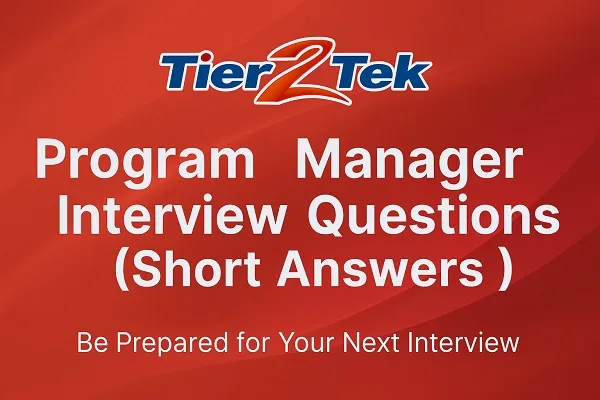Program Manager Interview Questions with Answers

Program managers play a vital role in orchestrating multiple projects, aligning strategic goals, and ensuring cross-functional teams work efficiently. Whether you’re preparing for your first PM interview or brushing up before a big opportunity, it’s essential to know what kinds of questions to expect—and how to answer them concisely. Below are 15 common interview questions with short, impactful answers to help you stand out.
1. What is the role of a program manager?
A program manager oversees multiple related projects, ensuring alignment with business goals, coordinating across teams, and managing risks, timelines, and stakeholders.
2. How does a program differ from a project?
A project has a defined scope and timeline; a program is a collection of related projects managed in a coordinated way to achieve broader outcomes.
3. How do you prioritize tasks across multiple projects?
I prioritize based on business impact, urgency, resource availability, and interdependencies. I often use frameworks like MoSCoW or RICE.
4. How do you handle scope creep?
I manage scope creep by having clear documentation, change control processes, and regular stakeholder communication to evaluate and approve changes.
5. How do you manage stakeholders with conflicting interests?
I align on shared goals, facilitate open communication, and use data to guide decisions. Empathy and transparency are key to building consensus.
6. What metrics do you use to track program success?
I track KPIs like ROI, delivery timelines, budget adherence, stakeholder satisfaction, and risk mitigation effectiveness.
7. How do you handle resource allocation?
I assess resource demand across projects, negotiate priorities, and coordinate with department leads to ensure optimal allocation without burnout.
8. Describe a time you managed a failing project.
In one instance, I identified bottlenecks through a retrospective, restructured team responsibilities, and reset expectations—delivering the program with a 10% delay but within budget.
9. What tools do you use for program management?
I commonly use Jira, Confluence, Microsoft Project, Smartsheet, and communication platforms like Slack or MS Teams.
10. How do you communicate progress to executives?
I use clear, high-level dashboards and concise status reports focusing on metrics, risks, and strategic alignment, tailored to executive priorities.
11. What’s your risk management approach?
I identify risks early, assess impact and likelihood, and create mitigation and contingency plans with owners assigned to each major risk.
12. How do you ensure team alignment across projects?
I establish shared OKRs, hold regular syncs, maintain transparent documentation, and encourage cross-functional collaboration.
13. How do you balance strategic vision with day-to-day tasks?
I reserve time for high-level planning and reviews while delegating operational tasks where possible, ensuring focus on long-term outcomes.
14. Describe your experience with cross-functional teams.
I’ve led programs involving engineering, product, marketing, and operations—driving collaboration through shared goals, structured meetings, and open feedback.
15. What makes you an effective program manager?
My strength lies in communication, strategic thinking, adaptability, and building strong relationships across teams to deliver business value.
🧠 Key Acronyms to Know for Program Manager Interviews
Being familiar with common acronyms can help you communicate effectively and show your understanding of the program management landscape.
Important Acronyms
Gantt Chart
A visual timeline that shows the schedule of a project’s tasks and milestones.
PMO (Project Management Office)
A department that defines and maintains project management standards across an organization.
KPI (Key Performance Indicator)
A measurable value that shows how effectively a project or program is achieving its objectives.
OKR (Objectives and Key Results)
A goal-setting framework used to define measurable goals and track their outcomes.
RACI (Responsible, Accountable, Consulted, Informed)
A matrix used to clarify roles and responsibilities in cross-functional projects.
MoSCoW (Must have, Should have, Could have, Won’t have)
A prioritization technique used for managing requirements.
ROI (Return on Investment)
A metric used to evaluate the profitability or value gained from a program or project.
SCRUM
An agile framework for managing complex projects, often used in software development.
Agile
A methodology that promotes iterative development, collaboration, and customer feedback.
WBS (Work Breakdown Structure)
A hierarchical decomposition of a project into smaller, manageable components.
